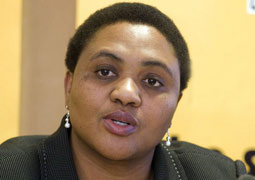
The Commonwealth Women Parliamentarians (CWP) Africa Region Steering Committee is buoyed by the future prospects of this body. This, after they met yesterday to reflect broadly on progress and a number of teething issues affecting the advancement and the promotion of women in leadership positions in African parliaments and legislatures, said the Chairperson of the CWP Africa Region, Ms Thoko Didiza.
The CWP Steering Committee is a statutory entity in terms of the CWP’s Constitution and is the one that governs the activities of this body in the African Region. It also oversees the work of various chapters of the CWP aimed at advancing gender parity.
Now in the mid-term of her tenure, she is more than convinced that the CWP has made some inroads in ensuring that the constitutions of respective member states of the CPA are in line with various gender equality instruments to which they are signatories.
In addition to that, during her tenure she re-energised regional gender advocacy workshops to overcome gender stereotypes embedded in African culture and tradition. “Patriarchy has for a long time prevented African women from ascending to high political office. It’s this culture imbedded in African tradition that does not envisage women as capable of being leaders of any social, religious or political formation or grouping that needs to be dismantled to enable women to ascend the political ladder based on their wherewithal and their intellectual competencies. That is being discriminated against on cultural grounds.”
One of the long-term solutions to uprooting the legacy of patriarchy is to motivate young women to embrace politics as a career, she said. “And that in my view should start at an early age and explain to them why it is important for them to occupy this space in our society,” she said.
But most of all, how can women rights be promoted and protected if women don’t play a role in championing them, she asked. “These are some of the strategies we, as CWP, want to implement.”
To ensure that the CWP Africa Region does not lose sight of its cause, once a year it holds a gender sensitisation workshop. This year the Africa Region gender sensitisation workshop was held in KwaZulu Natal.
“Out of which we came up with strategies to support female candidates in countries that are scheduled to hold general elections, such as Sierra Leone, which held its election in April, Swaziland, Botswana as well as Rwanda, which will hold their elections later in the year,” she said.
But for this to be successful, the CWP has resolved to engage political parties to ensure that they increase the number of women’s representation on their parliamentary lists in the future.
To her, it is not enough to only have women’s representation for the sake of it, coupled with that is a need to capacitate women parliamentarians. To this effect, the CWP Africa Region is set to devise a training programme that will mentor and provide women parliamentarians with leadership skills. “These are some of the strategic imperatives that I would like to see implemented before the end of my tenure next year,” she said
Organisationally, there is now a resolve to have a database that will profile the work of the CWP in the CPA Africa Region to heightened its aims and objectives, and to be more visible on the ground. “We have witnessed the yields of our ground work,” she pointed out. “Now when African parliaments send their representations to CPA conferences, they make sure that there is, on balance, an equitable representation of women in their delegations,” she said.
“These are successes that are not often recorded, but irrespective of that, we should not overlook them for they have a bearing on the profile of the CWP on the continent,” she added.
What remains a challenge, she pointed out, is the coordination of the CWP sub-regions in Africa. A resolution has been taken by the CWP Steering Committee that they should use the platform provided by the 49th Commonwealth Parliamentary Association (CPA) Africa Region Elective Conference to propose a model for coordination to create a synergy among CWP sub-regions so that this body can be more coherent in its cause.
In her view, what is often overlooked in the fight against gender discrimination is the need for the involvement of men as champions of gender equality. According to her, the war against gender inequality cannot be won without the involvement of men. “The struggle for women’s right is a struggle for human rights. And we cannot, in my view, win this war without working together or standing side-by-side with men in overcoming gender inequality. Because gender equality is not only a women’s matter, it also involves men.”
The challenge, she paused for a moment to recollect her thoughts, is how we change cultural perceptions and re-socialise our men to make sure that they treat women in a manner that is befitting of their status as human beings – and that we are equal in the eyes of our democratic constitutions. “Getting men not only to understand, but to embrace this, in my view, is a critical intervention in the fight against gender inequality that we should not shy away from.”
By Abel Mputing
15 August 2018

